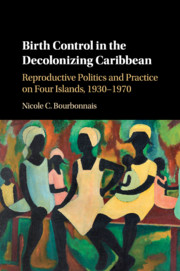 Birth Control in the Decolonizing Caribbean
Birth Control in the Decolonizing Caribbean Book contents
- Frontmatter
- Dedication
- Contents
- List of Figures, Maps, and Tables
- Acknowledgments
- List of Acronyms
- Introduction
- 1 The Answer, an Aid, a Right: Birth Control Debates and Social Movements in the Caribbean
- 2 From Politics to Practice: The Colonial Office, Foreign Activists, and Local Family Planning Clinics
- 3 Beyond Culture or Choice: Working-Class Families and Birth Control Clinics
- 4 A Matter of Cost: Reproductive Politics, State Family Planning Programs, and Foreign Aid in the Transition to Independent Rule
- Conclusion
- Bibliography
- Index
Conclusion
Published online by Cambridge University Press: 06 January 2017
- Frontmatter
- Dedication
- Contents
- List of Figures, Maps, and Tables
- Acknowledgments
- List of Acronyms
- Introduction
- 1 The Answer, an Aid, a Right: Birth Control Debates and Social Movements in the Caribbean
- 2 From Politics to Practice: The Colonial Office, Foreign Activists, and Local Family Planning Clinics
- 3 Beyond Culture or Choice: Working-Class Families and Birth Control Clinics
- 4 A Matter of Cost: Reproductive Politics, State Family Planning Programs, and Foreign Aid in the Transition to Independent Rule
- Conclusion
- Bibliography
- Index
Summary
The shifting politics and practices of reproduction in the Caribbean that began in the 1930s and accelerated in the 1960s took off in the 1970s and 1980s, attracting the attention of both local and international commentators. While conducting research in a small town in Trinidad in the 1980s, for example, anthropologist Joseph Nevadomsky highlighted the way villagers would openly discuss birth control in mixed company, relating experiences and sharing complaints about side effects and preferences. As one man reported to him,
I was very surprised to see a woman from the village, whom I know to be a very shy person, buying contraceptives in a pharmacy. I was there and she greeted me, then asked the clerk for Durex rubbers. A few years ago you could never get a woman to do that sort of thing. Very few people knew about birth control … a man who brought condoms home could pass them off as balloons if his children or wife happened to find them. Children used to bring them to school and blow them up.
Sociologists also noted the high rates of birth control literacy in several Caribbean countries; a 1986 study, for example, showed that some 75 percent of Barbadian women were able to name six or more types of contraceptives. This increased birth control literacy also seems to have corresponded with an increase in birth control practice. Indeed, over the course of the 1960s–1980s, Caribbean countries experienced rapid declines in their birthrates, and by 1990, the Anglophone Caribbean as a whole was recognized as having had some of the most dramatic declines in total fertility in the world. As Patricia Mohammed argues, by the thirtieth anniversary of the Family Planning Association of Trinidad and Tobago in 1986, birth control had moved fairly concretely from something “not mentioned in polite circles and unheard of in others” to “an accepted institution.”
Family planning campaigns and state programs cannot claim sole responsibility for these shifts. On some islands, such as Trinidad, birth-rates began to decline before the expansion of state clinics, suggesting that some of those motivated to limit their families were able to find ways to do so without the support of the state.
- Type
- Chapter
- Information
- Birth Control in the Decolonizing CaribbeanReproductive Politics and Practice on Four Islands, 1930–1970, pp. 217 - 225Publisher: Cambridge University PressPrint publication year: 2016


